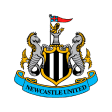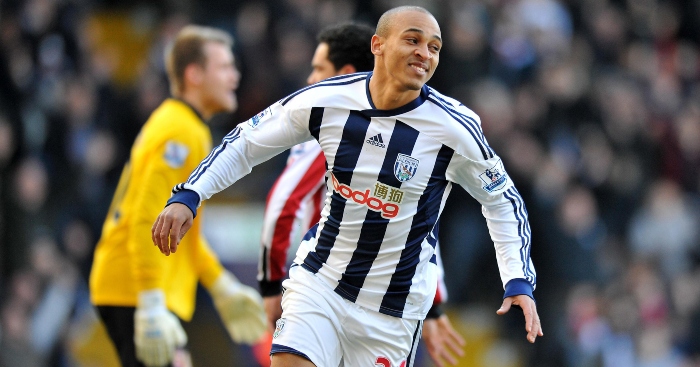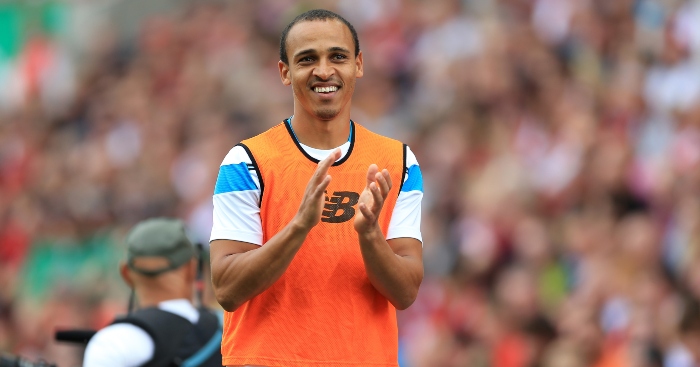Peter Odemwingie talks West Brom, QPR truth, Stoke fans and future plans
Football really is a global game and Peter Odemwingie knows that better than most. Born in Tashkent, the capital of modern-day Uzbekistan, to a Nigerian father and a Russian mother, he represented clubs in seven different countries, spread across three continents.
“I was very driven career-wise and I love this game,” Odemwingie says. “I don’t know why some people can’t settle in another country. The dressing room is full of boys – it’s always lively and you can always find someone to get close to and have a bond with.
“I never struggled to adapt. I really enjoyed the football itself and that was the language that was more important than anything.”
After spending the first 18 months of his life in the Soviet Union, Odemwingie and his parents left for Nigeria. Seven years later they returned to Russia, going from Tashkent to Chelny, where their son’s career started in earnest as he was recruited to the CSKA Moscow academy.
Then, at the age of 17, he moved back to Nigeria again, turning professional with Bendel Insurance, where he scored 19 goals in 53 league appearances.
“My parents had finished their studies, and salaries for doctors were not great in Russia at that time. With their degrees, Nigeria was more appealing and they could do more work. That was the main reason, but also my dad believed that my career would progress better through Nigeria than Russia so we went and he was right.”
Odemwingie earned a call up to the Nigeria squad in April 2002, winning his first cap against Kenya, and signed for La Louvière that same summer. He won the Belgian Cup in his first season and by 2004 had impressed enough to get a move to Lille, where he believes he played his best football.
“The Premier League was the toughest challenge and the hardest place to get good numbers, but I think I was probably sharpest at Lille in terms of movement, speed and goals.
“I was more mature in the Premier League, but Lille was a great time as well. We played in the Champions League and knocked Manchester United out of the group one year. We beat AC Milan away at the San Siro to get through to the next round and I scored.”
After two years of competing with Europe’s best, Lille slipped to mid-table in Odemwingie’s final season as the squad started to be picked apart. Kader Keita and Mathieu Bodmer left to join a dominant Lyon while Odemwingie went to Lokomotiv Moscow.
There had been interest from Roma and Werder Bremen, but the Russian side made the decisive move. “There were a few options that I could have waited for, but the first team that put money down on the table for Lille was Lokomotiv Moscow and they accepted it.
“I thought it was a step back maybe in terms of the league, but they always played in European competitions. It was also a chance to live with my mom again because at the age of 14 I left. She moved back to Moscow then and she’s still working very hard to this day. She loves her job.”
Lokomotiv won the Russian Cup the year that Odemwingie arrived, but they didn’t enjoy great success during his time there. Regardless, he enjoyed being back in the place where it all began.
“I love Russia. It’s my country. I grew up there. There were some negative parts, but it’s my motherland and I love it. I always kept in touch with my classmates and I just returned from there recently. I love the language, the cinema and the jokes. Moscow is a top city.”
Unfortunately, Odemwingie’s departure from Lokomotiv brought some of the worst elements of Russian society to the fore. Racist banners targeting the striker were displayed by supporters following his move to West Bromwich Albion.
A group of Lokomotiv Moscow fans made this banner when Peter Odemwingie left the club and moved to West Bromwich. pic.twitter.com/oSBXi3hcr2
— Toke Theilade (@TokeTheilade) June 30, 2014
Odemwingie is keen to stress that racism is far from unique to Russia, as the rise in incidents of abuse in England, both in stadiums and on social media, has shown.
“Russia has a bad reputation, but we see today that it’s everywhere in the world. It’s a crowd mentality. It’s aggression, it’s alcohol, it’s youths misbehaving. I think it’s everywhere around the world. Of course it wasn’t great to experience that, but sadly it’s a problem in industries like football where there is a lot of money and a lot of envy.
“But if you go to those same countries the general population are pretty tolerant and welcoming. Russia is no worse than any other country in Europe where we read headlines of racial abuse going on.”
Move to England
Although Odemwingie ended up at West Brom, it was actually local rivals Birmingham City who were the first club to make an offer for him ahead of the 2010 World Cup. Lokomotiv held firm as they thought that a good tournament would boost his value, but Nigeria crashed out at the group stage.
So with one year left on his contract, West Brom were able to pick Odemwingie up on the cheap. He soon became their star man.
“I believed in myself. A lot of people were saying that it was the wrong club, that they go up and then they come down, but I have a strong intuition generally. I had a good feeling about the move and when I was signing the contract the sporting director said, ‘If you score goals here, everything else will fall into place.’
“I happened to score the winner on my debut within two days of joining the club, and I won Player of the Month for the first complete month I played in England. I settled into the league well.”
It was an ideal start and he scored 15 goals that season as West Brom were rescued from the threat of relegation by Roy Hodgson, eventually rising to 11th place. Odemwingie was again named Player of the Month for April. He would repeat the trick once more in his second season after bagging a hat-trick against Wolves on the way to a top-half finish.
“It’s a dream league. It’s so simple yet so complicated. Coming from Russia, where you’d sometimes spend three days in the clubhouse before home games, I couldn’t believe that in England you’d just drive up to the stadium on the day like it’s Sunday league,” he laughs.
“But as soon as I arrived at The Hawthorns for the first time I started seeing the fans walking up and I could feel that there was something in the air in the dressing room. There was a lot of music playing and the players were so relaxed. It was like the quiet before the storm when I walked out on the pitch. They gave me a great reception straight away.”
Eagerly embraced by Albion supporters on his arrival, Odemwingie’s relationship with them soured in his third season as he grew frustrated at a lack of playing time and looked to move elsewhere.
“Steve Clarke came in as manager. I have a lot of respect for Steve, but he has his own managerial style and at the time it wasn’t something I liked. He often put me on the bench without saying anything, even if my last game had been fantastic. This was something new I had to deal with and I think if we had more communication maybe I’d have been less angry about it.
“He moved me out of my striking role onto the wing. In my first two seasons I’d been top scorer for a reason, because I played through the middle. I had to deal with that at the same time as being one of the players they rotated.
QPR truth
“There was all this talk that I wanted to leave because Queens Park Rangers were giving out big contracts, and that it was money-motivated, but the summer before I’d had massive offers from the Middle East and I never even gave them a single thought.
“I thought I still had a lot to offer the game and the Brazil World Cup was around the corner so I needed to be playing. I was a bit angry that the club never protected my image. They made people think that money was my motivation, but that was never the case.”
The saga reached a slightly absurd climax when Odemwingie was interviewed in his car outside Loftus Road on transfer deadline day in January 2013, having driven down in the hope that an agreement could be reached. It never was as Junior Hoilett belatedly pulled out of a potential swap.
“If all parties that took part in that whole situation would have said exactly what happened then everyone would have understood. But nobody spoke about it because it wasn’t in their interests to do so. I took the hit myself. I was that close that they prepared a shirt with my name on.
“From what I knew, we had agreed everything. They were working on bringing Junior Hoilett to West Brom and apparently him changing his mind at the last minute is what killed the deal. I wasn’t aware of that, otherwise I wouldn’t have gone anywhere.”
Odemwingie criticised the club publicly for what transpired and was fined two weeks’ wages. He was eventually integrated back into the first team but felt stung by the way perceptions of him had changed.
“It was annoying to listen to West Brom fans singing that I was greedy when people inside the club knew what was going on between me and a few of my colleagues and Steve Clarke. They knew my ambitions and I always gave my best in games. It was a bit sad that, as they say in England, they hung me out to dry.
“It was a sad story, but most importantly my relationship with the club survived the hit. I played for them with honesty and I loved it there. I can’t forget them singing to me throughout the games. You can’t blame fans – they see, they read, they react. I could absolutely understand their anger.”
The wounds gradually healed, leaving Odemwingie and the Albion supporters to focus on the good times instead, but a parting of the ways was still in everyone’s best interests. Following a short and somewhat disappointing spell at promoted Cardiff City, Odemwingie found the fresh start and redemption he was looking for at Stoke.
“I was happy to return closer to Birmingham. I lived there and I was settled there. I was happy to join Stoke and it was really nice that people didn’t judge me based on what they’d heard. When I walked into the dressing room nobody was putting my attitude under the microscope.
“At Stoke the dressing room was really fun. I hit the ground running thanks to Mark Hughes, who trusted me, and the supporters sang the song – ‘He scores goals.’”
They continued to do so even though Odemwingie missed a lot of football after he suffered a cruciate ligament injury when stretching to keep the ball in play during a win over Manchester City. The backing he received was much appreciated.
“That was something that I’ll never forget. When I needed fans the most in my career they were absolutely there for me.”
With opportunities scarce following his return from injury, Odemwingie went on loan to Bristol City and then spent a few months at Rotherham United after being released by Stoke. When that contract came to an end he embarked on a new adventure on the other side of the world.
“I only recovered from a calf injury in April and the leagues everywhere were finishing. I had this offer on the table from Madura United in Indonesia. The only place I knew there was Bali and the town was really close. I thought it would be good to retire in a beautiful place.”
It was a fun final swansong for Odemwingie, who scored 15 goals in 22 games, but he didn’t officially hang up his boots until earlier this year. Tempted to prolong his career, and confident that he could still perform in the Championship at the age of 38, it was a difficult decision.
For now the former Nigeria international is excelling at another sport. He only started playing golf when he came to England but is already down to a handicap of four. A regular at his local club and in various tournaments, sometimes alongside other ex-footballers, he’s seeing how far he can go.
There are other ambitions too, including coaching and completing a degree.
“I’m happy that I’ve retired and I’m looking forward to the next part of my life,” he says. “I will be doing my coaching badges slowly and starting my education.
“The next five years I’m going to dedicate to education and pursue a degree just to tick that box. I have an urge to study, probably because my parents are doctors and it’s somewhere in my genes, calling me to do something outside of sport.”
By Sean Cole
This article was originally published in September 2019.
More from Planet Football
A tribute to Peter Odemwingie, a wonderful player unfairly remembered
Can you name the top Premier League goalscorer for every nationality?
A celebration of Rory Delap and an early-Prem Stoke side neutrals loved
Filipe Teixeira: I played with Dinho, but I was happiest at West Brom
























